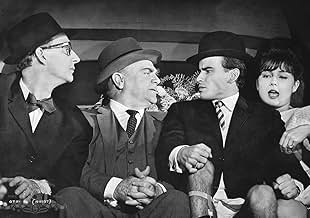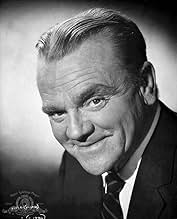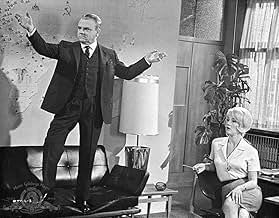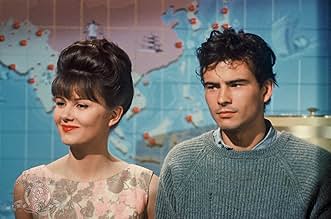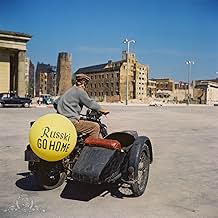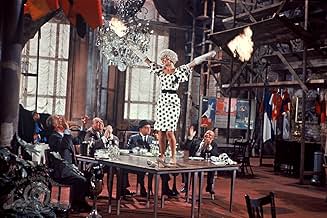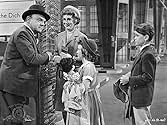En el Berlín occidental de la Guerra Fría, un ejecutivo de Coca-Cola recibe el encargo de cuidar a la hija de su jefe.En el Berlín occidental de la Guerra Fría, un ejecutivo de Coca-Cola recibe el encargo de cuidar a la hija de su jefe.En el Berlín occidental de la Guerra Fría, un ejecutivo de Coca-Cola recibe el encargo de cuidar a la hija de su jefe.
- Dirección
- Guión
- Reparto principal
- Nominado para 1 premio Óscar
- 1 premio y 8 nominaciones en total
- Fräulein Ingeborg
- (as Lilo Pulver)
- Melanie Hazeltine
- (as Lois Bolton)
- Krause
- (voz)
- …
- Cindy MacNamara
- (sin acreditar)
Reseñas destacadas
Wilder plays no favorites -- and he takes no prisoners -- here. Everything within his considerable reach (the Cold War, the postwar era, spy-exchanges, Communism, capitalism, European aristocrats, idealism and cynicism, JUST for starters) is lampooned equally. (Even at least one of Cagney's early performances, in "Public Enemy," takes a shot.)
Frankly, I'm surprised this film today has so many staunch fans who weren't around back when so much of its humor was "topical." Its ongoing appeal has to be attributed both to Wilder's pacing and to James Cagney's hallmark performance as McNamara (a poster child for high blood-pressure if ever there was one). Neither he nor Wilder ever let up, ably aided by a solid cast (Horst Bucholtz in particular, strangely enough!) who manage somehow always to catch up.
"One, Two, Three:" that's how fast the gags fly. See if you can keep up.
For what was and what should have remained his swan song to the world of film James Cagney heads the cast in this. He's the man in charge of Coca-Cola's operations in Germany which is headquartered in West Berlin and he's had a lovely little present dumped in his lap. The daughter of the CEO of Coca-Cola is in Europe and now she's in Germany and he's expected to watch out for her. The daughter is played by Pamela Tiffin and she is one of the biggest airheads ever portrayed on the screen. She's fallen big time for a German kid played by Horst Bucholtz. They've gotten married.
Bucholtz is a kid who's real good at spouting all kinds of left wing slogans without delving to deeply into their meanings. He's a Communist and that drives Cagney nuts and if it drives Cagney nuts, Tiffin's father is sure to go over the top. Cagney takes it upon himself to get Bucholtz arrested on the East Berlin side as an American spy.
Of course a small memento of their married life has developed inside Tiffin so now Cagney has a real problem. He's got to get Bucholtz back and turn him into a money grubbing capitalist in his image. The frantic pace at which this is attempted, racing against the clock when Tiffin's father played by Howard St. John arrives in Berlin is what the rest of the film is about.
Wilder has a ball reducing the Cold War to its basic absurdities. The USA is symbolized by James Cagney who thinks the whole world will become America if only enough Coca-Cola is peddled. Cagney comes real close to proving it so.
The Communists come out far worse. Karl Marx's world always looked nice on paper, but always has had a real problem being converted into a functioning state. The Russians are also good at spouting the party line, but in One, Two, Three, Wilder shows how very easily they can be influenced by some of life's most elemental things and I don't mean Coca-Cola.
Cagney did not always get along with Wilder, but both men were professional enough to bury certain creative differences. Cagney was kind and patient with Tiffin who was getting her first real break in film. However he grew to positively loath Horst Bucholtz. In his memoirs which came out in the 1970s, Bucholtz was the only colleague who Cagney had anything really critical to say about.
During the middle of the film being shot, the Russians stopped the flow of traffic from West and East Berlin. Some shots had to be redone around the Brandenburg Gate, a whole set had to be constructed. I suppose a well trained cinema professional could spot the shots where the real and the fake Brandeburg were used. I sure can't. The following year, the Berlin Wall was built, so Wilder got his film done just in time.
Arlene Francis plays Cagney's exasperated wife and she of What's My Line does just fine. Cagney made an appearance on that show just before shooting started and gave the picture a big old plug.
The laughs come pretty fast and furious as James Cagney struggles mightily to prevent the arrival of "another bouncing, baby, Bolshevik."
From the time you hear the first few bars of "The Sabre Dance" thru the final shot of James Cagney, you are on a constant roller coaster, and you don't want to get off. It is a manic, wild movie that never disappoints or lets down.
The engine that drives this lunacy is James Cagney. In one of his best, funniest and energetic performances, he is nothing short of amazing. He is a whirling dervish, at the heart of a storm that he has no control over. I don't want to give any of the story away, suffice to say that he is nothing short of spectacular. In Cameron Crowe's book on Billy Wilder, Wilder laments that Cagney was so loud and energetic at the start of the film, that his character really has nowhere to go, in terms of building, and reacting to the chaos. I would agree with that assessment, but Cagney's performance does not let the audience stop and catch it's breath long enough for this to really be a factor.
Wilder and Diamond have brought us another gem. Is there another writing team that within a span of three years, have created three better pictures than the ones they have given us (Some Like It Hot, The Apartment, One,Two,Three)? I doubt it.
Kudos all around to the supporting cast as well. Especially, Arlene Francis, as Cagney's wife, and Lilo Pulver as his secretary. Also watch for some "inside" jokes. Like when Cagney threatens Horst Buchholz with a grapefruit, and Red Buttons, in a cameo, doing a Cagney imitation.
Great fun from start to finish. 10/10
The talk is fast-paced. The humor is broad and full of Wilder wordplay. Cagney is an unrelenting engine. He is buzzing with energy and I half-expected him to explode in song and dance. The machine gun dialog is non-stop and can get tiring at some point. This is a feat of performance from the great Cagney.
¿Sabías que...?
- CuriosidadesJoan Crawford (then on the board of PepsiCo) telephoned director Billy Wilder to protest the movie's Coca-Cola connection. Wilder then added a final scene in which James Cagney buys four bottles of Coke from a vending machine. The last bottle out of the machine isn't Coke but another brand . . . Pepsi.
- PifiasSchlemmer calls his former superior officer in the SS "Herr Oberleutnant". The SS had no rank of Oberleutnant nor did its members call each other Herr. Oberleutnant was a German Army rank. The corresponding SS rank was Obersturmführer. In the German (dubbed) version, Schlemmer correctly addresses him as "Obersturmführer".
- Citas
Borodenko: When will papers be ready?
C.R. Macnamara: I'll put my secretary right to work on it.
Mishkin: Your secretary? She's that blonde lady?
C.R. Macnamara: That's the one.
Peripetchikoff: [after conferring with the others] You will send papers to East Berlin with blonde lady in triplicate.
C.R. Macnamara: You want the papers in triplicate, or the blonde in triplicate?
Peripetchikoff: See what you can do.
- ConexionesEdited into Grand format: Amérique, notre histoire (2006)
Selecciones populares
Detalles
Taquilla
- Presupuesto
- 3.000.000 US$ (estimación)
- Recaudación en todo el mundo
- 146 US$
- Duración
- 1h 44min(104 min)
- Color
- Relación de aspecto
- 2.35 : 1


